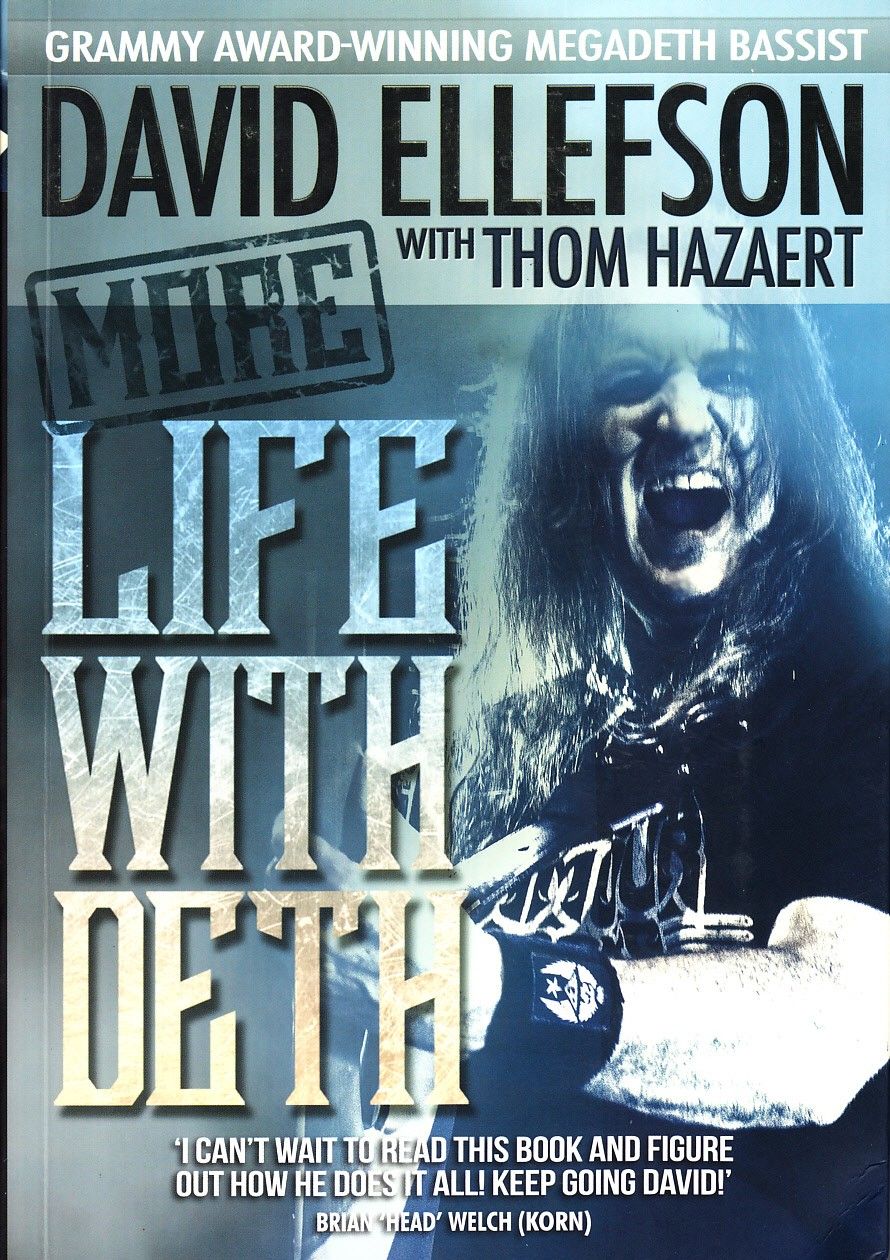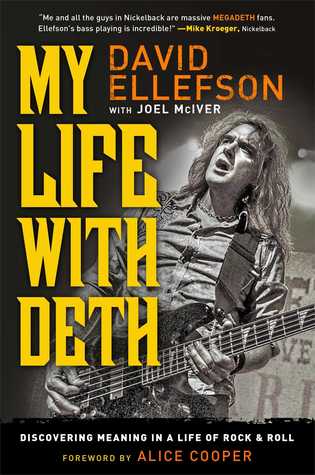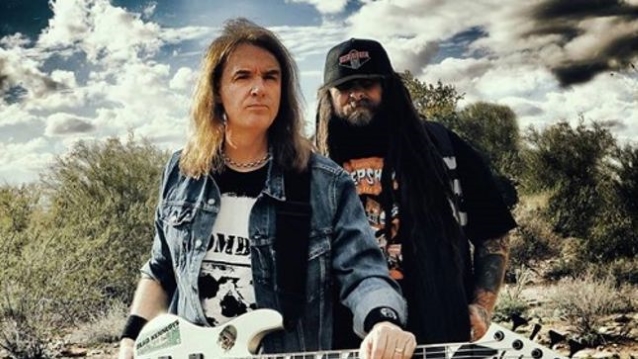
I know I haven’t published a lot lately, but it’s no lie to say there are a lot of moving parts in my life right now. But I’m back to review a really interesting book from David Ellefson. If you’re into heavy metal, you know who he is! He’s of course best known as the bass player of Megadeth but as fans, and readers of his books, know he’s much more than that. He released his newest book, More Life with Deth, in July, 2019. As a Megadeth fan, I’m always eager to learn more about its members. And here was another glimpse into the life of one of its co-founders.
This isn’t David’s first foray into writing. In 1997, he wrote an insightful book called Making Music Your Business and delved heavily into the business aspect of the music industry. After going through life-changing experiences, not the least of which being away from Megadeth for almost 10 years, it was time to look into his own life and share his own stories. In 2013, he released My Life with Deth: Discovering Meaning in a Life of Rock & Roll. I don’t have sales numbers for the book, but it definitely launched new venues in Ellefson’s career as he started doing spoken word tours and really seeing the demand around the world for his stories. And if you were looking for another indicator that the 2013 book was a success, he just released his update on that – our topic of review – More Life with Deth.
Even though there are similarities between the two introspective books, there is one big difference. More Life with Deth saw renowned author Joel McIver co-write the book with Ellefson; possibly in the form of a ghostwriter since the stories were always told from Ellefson’s perspective. But this time, we are introduced to someone who has become quite influential in David’s career: Thom Hazaert. Based on Thom’s own prologue in the book, they originally talked about him being a ghost writer. But he and Ellefson soon decided it was better to feature Thom’s own voice. It was a wise decision on their end. It made the book more interesting to me. Thom holds a unique position because he was a Megadeth fan from back in the day, he’d gotten to know Ellefson before they began any business relationship, and now, he is David’s partner in almost every business endeavor he is in. Basically, anything David Ellefson has been engaged in in the last few years outside of Megadeth, chances are Thom Hazaert was a part of it; usually being the one suggesting the idea in the first place! A part of this book is about how they met, how they became business partners, and how some of their ideas, like Ellefson Coffee Company and EMP Label Group, came about.
More Life with Deth had already touched upon his upbringing in Minnesota; and here we get more details about his life in Jackson, MN. This time, there’s more emphasis on what life was like there. One of my favorite chapters was one of David’s relatives’ notes on their family history. Fascinating stuff! David has taken over the family archivist role now and he even included some of his own notes to update the Ellefson family history. Really makes you appreciate how much he cares about his background. You’ll also read about how rewarding it was for him to be active in Jackson and become a part of its business culture decades after leaving it to pursue music in LA.
The best thing about the book, overall, is Ellefson’s honesty in revealing his true feelings in detail. I especially found the era when he was out of Megadeth, 2002-2010, to be the most captivating. I’ll get to my thoughts on Ellefson’s relationship with Mustaine. But I found this era the most captivating because Ellefson is brutally honest about his struggle. It all worked out in the end, but how do you manage your life after the band you’ve been in for so long is no longer there? How do you keep paying the bills? Who do you call next? What projects do you do next? It’s a lot to take on. As nice as David is, he made mistakes too. I think suing Dave Mustaine was his biggest. But reading this book… I don’t know, you can sort of understand why ithappened. And looking at David Ellefson’s life, he was really in this bizarre space where he needed to discover who he was outside of Megadeth. It was a daunting task. Before that discovery could begin, Ellefson went through a period where he was angry and frustrated. He talks about that openly, which I respect.
“My identity, income, and life plans had always been framed around Megadeth—plans I’d had since I was eighteen years old. Who would I be if that went away? In some ways, I became enslaved to both money and prestige. I had to let that go in order to grow.”
Luckily, the frustration lent itself to a more positive mindset and David began saying “yes” to new projects coming his way. A big chunk of the book is dedicated to the idea of just saying “yes” to people asking you if you would like to be involved with their project. You’ll get to read about his own bands such as F5 and Temple of Brutality, his stint being in Artist Relations at Peavey, joining other musicians for a tour or two, re-connecting with old friends and acquaintances to start new relationships, and every human emotion one goes through when dealing with all these changes. Whenever relevant, David also added a snippet from the key people who were involved with whatever story he would be telling in that chapter. This, much like Thom Hazaert’s additions, provides a great way to tell these stories because you get more than one person’s point of view about the same story.
There’s a lot about Dave Mustaine in there as well, as you would expect. As a fan of the band, I always want to know more about their history, and how things are working today versus back in the day. There’s a lot here about that. As you can imagine, their relationship is complicated. At the heart of this is songwriting and the direction of the band. People always look for an excuse to criticize Dave Mustaine, but I don’t blame him for wanting to control Megadeth more than anyone else. It’s true that so many has contributed to it, but at the end of the day, it’s his baby; and the Megadeth sound that we love has been established through his songwriting. Let’s not pretend otherwise. So, I can understand someone being protective over this – especially after having resurrected the band in 2004. Mustaine worked tirelessly to bring everything back. David talks a lot about this dynamic. After he came back to the band in 2010, it wasn’t the same Megadeth anymore. It couldn’t be. This happens to so many bands where one key member is away for whatever reason, the band carries on, then this person comes back but with a different deal. It’s hard for fans to accept it but it’s normal. Do you think Alex Skolnick has the same deal he had in the ‘80s with Testament? Or remember the time Dave Lombardo complained about Slayer’s finances and made it public? It’s different. Dave Mustaine decides the direction Megadeth will head in. For better or worse, that’s the deal. I think Ellefson understands and respects it for the most part, but I did sense some frustration in his tone. He knows he’s done a lot for Megadeth – and he certainly has – so it must be hard to focus more on bass and less on songwriting. So I’m really happy for him that he decided to play with different musicians, find new outlets for his own songwriting, and go into some other businesses with Thom Hazaert like the Ellefson Coffee Company and EMP Label Group. He says in the book that when he re-joined Megadeth, the very first thing he started preparing for was what to do if the band disbanded again. He knew he needed to find his identity outside of Megadeth and I think that was a healthy thing to do.
“There’s one thing that I’ve always appreciated about Dave Mustaine: Megadeth was never about buddies sitting around jamming. It’s a very focused mission, and Dave has the vision to achieve it. You meet him on his terms, not yours, and that dynamic works. Without him, the band wouldn’t have its edge; without me, it would be complete gunfire at all times. The strategy of battle can’t be constant surrender, but it can’t be constant attack either. There has to be a little bit of both. He’s the colonel and I’m the lieutenant, and between us we win the war. That sumps up the dynamic between me and Dave, as it has from the very beginning of Megadeth.”
Another fascinating chapter was about the failed reunion attempt around 2015-16. It was a great read, but when you read Ellefson’s honest comments about Nick Menza and Marty Friedman, you kind of wonder what reaction Dave Mustaine would have gotten if he had written the same exact words? Not that Mustaine is above criticism, but it’s astonishing how we treat people differently solely based on their image. Anyway, back to the reunion attempt. Ellefson gives you great insight as to why Drover and Broderick left in the first place. And it sounds to me like both Mustaine and Ellefson knew that the RIP era reunion was never going to work, but they wanted to give it a try. They felt like they owed it to the fans to give it a try. Ellefson says Menza wasn’t up to performing the songs. Some of his YouTube videos with Soultone Cymbals had looked great, so I thought he was up to the challenge, but Ellefson tells it differently. “It was clear on Nick’s arrival that day that he was not going to be physically ready for the demands of a world tour”, he says in the book. As for Friedman… Well, for a guy who is incredibly happy in Japan playing whatever he wants whenever he wants to play it, the Megadeth reunion is a hard sell. Ellefson says he asked for an amount of money that they just couldn’t agree to. Sounds like Friedman did that on purpose. Anyway, I’m glad Marty didn’t come back to the band because he’s not the kind of person who can exist in a band. Great guitarist, but he needs to be on his own. It’s better for all parties involved.

You don’t have to be a Megadeth fan to enjoy the book. It’ll be a better experience if you’re a fan because then you’ll already know a lot of the characters mentioned; but I think anyone who wants to gain some insight on how a heavy metal musician beat his addiction, went through career ups and downs, conquered business ventures, played in one of the biggest metal bands but also had to learn how to exist outside of it, you will find yourself engaged.
David Ellefson is a genuinely interesting person, so I’m always up for reading whatever he writes. It would have been a better read if it was edited a bit better; at times, it felt like people spoke their parts and it was just transcribed verbatim, but there’s so much cool insight in there that you kind of don’t care about all that. It just flows well. Ellefson is an underrated bass player; I think he’s one of the best in the genre! But he’s also just a good guy. And you’ll see it come through in the book when you read what others have written about him.
My take as a fan? He’s not afraid to tell you what the thought in the past and what he thinks now. He’s okay with admitting his mistakes, but he’s also okay with sticking up for what he believes in. He tells you what made him happy; and he also tells you what frustrated him with no filter. It created an interesting book, but without the attacks that you sometimes see in memoirs. I also appreciate his role in Megadeth. I hope we see the colonel and the lieutenant work together for a long time!
Sources & Additional Reading:
- David Ellefson with Thom Hazaert: More Life with Deth, Jawbone Press (July 16, 2019)
- David Ellefson with Joel McIver: My Life with Deth, Howard Books; Reprint edition (July 8, 2014)




